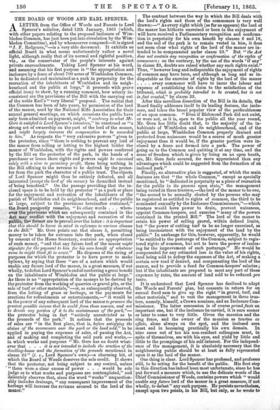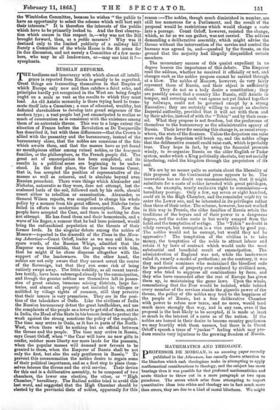THE BOARD OF WOODS AND EARL SPENCER.
ALETTER from the Office of Woods and Forests to Lord Spencer's solicitor, dated 12th January, 1865 (which, with other papers relating to the proposed inclosure of Wim- bledon Common, has just been put into circulation by the Wim- bledon Committee), and by whomsoever composed—it is signed "J. F. Redgrave,"—is a very able document. It exhibits an official Board in what seems unfortunately rather a novel light, although really that of its normal and rightful position, viz., as the conservator of the people's interests against private encroachments. Taking Lord Spencer at his word, and assuming that his first purpose is "the appropriation and inclosure by a fence of about 700 acres of Wimbledon Common, to be dedicated and maintained as a park in perpetuity for the recreation of the inhabitants of Wimbledon and its neigh- bourhood and the public at large," it proceeds with grave official irony to show, by a running comment, how utterly in- consistent are the provisions of the Bill with the carrying out of the noble Earl's "very liberal" proposal. The recital that the Common has been of late years, by permission of the lord of the manor, used by the National Rifle Association for their annual general meetings, on which occasions the public have only been admitted on payment, might, "contrary to what Mr. Gore is satisfied is Lord Spencer's intention," be construed as "a strong act of ownership on the part of the lord of the manor, and might largely increase the compensation to be awarded to him." As respects the " very extensive powers " given to the protector, since "there is nothing to prevent any lord of the manor from selling or letting to the highest bidder the manor of Wimbledon, with the rights and powers conferred by the Bill on the protector of the park, in the hands of a purchaser or lessee those rights and powers might be exercised solely with a view to pecuniary profit, there being nothing in the Bill affixing to the revenue to be derived by the protec- tor from the park the character of a public trust. The objects of Lord Spencer might thus be entirely defeated, and all interested (except the lord of the manor) be damnified instead of being benefited." On the passage providing that the in- closed space is to be held by the protector " as a park or place for the enjoyment and recreation of the inhabitants of the parish of Wimbledon and its neighbourhood, and of the public at large, subject to the provisions hereinafter contained," the Board pungently remarks, " In other words . . . when- ever the provisions which are subsequently contained in the Act may conflict with the enjoyment and recreation of the public, the former are to prevail over the latter : it is important that this should be borne in mind in reference to various clauses in the Bill." Mr. Gore points out that clause 5, permitting money to be taken for entrance into the park, when closed by consent of the Home Secretary, contains no appropriation of such money, "and that any future lord of the manor might stipulate for the payment to him for his own benefit of whatever sums he might think fit to exact." He disposes of the string of purposes for which the protector is to have power to make bylaws, by saying that these "are of a nature which would enable any future lord of the manor, in a great measure, if not wholly, to defeat Lord Spencer's end of conferring a great benefit on the inhabitants of Wimbledon and the public at large." As there is no "appropriation of the moneys to be derived by the protector from the working of quarries or gravel pits, or the sale of turf or other materials,"—or, as subsequently observed, from the letting of grass or herbage, or the payments for erections for refreshments or entertainments,—" it would be in the power of any subsequent lord of the manor to procure the greatest possible income that he could from those sources, and not to devote any portion of it to the maintenance of the park,"— the protector being in fact " entirely unrestricted as to the proceeds of the park." It notices that the proceeds of sales are " in the first place, that is, before satisfying the claims of the commoners over the park or the land sold," to be applied in paying the expenses of sales, of passing the Act, and of making and completing the said park and works,— in which works and purposes " Mr. Gore has no doubt what- ever that . . . it is not intended to include the erection of the dwelling-house and the formation of the grounds mentioned in clause 25 " (i. e., Lord Spencer's own)—a charming hit, of which the Board of Woods deserves the sole credit. It shows that the protector, not being subject to any control, unless "there were a clear excess of power . . . would be sole judge as to what works and purposes are contemplated," and delicately observes that, since the word "works" unquestion- ably includes drainage, " any consequent improvement of the herbage will increase the revenue secured to the lord of the manor."
The contrast between the way in which the Bill deals with the lord's rights and those of the commoners is very well
drawn:—" *As every right which (as far as appears) the lord of
the manor has hitherto exercised or been in the enjoyment of will have received a Parliamentary recognition and confirma- tion in perpetuity for his own benefit by clauses 6 and 16, and the soil of the park is to remain vested in him, it does not seem clear what rights of the lord of the manor are in-
tended to be compensated under clause 23." But " the Act does not contain any recognition or confirmation of the rights of commoners; on the contrary, by the use of the words if any'
in clause 23, doubts are raised whether any such rights exist." Thus, "however long and indisputable the enjoyment of rights of common may have been, and although as long and as in- disputable as the exercise of rights by the lord of the manor . . . . every commoner will have to incur the labour and
expense of establishing his claim to the satisfaction of the tribunal, which is probably intended to be created, but is not in fact created," by clause 23.
After this merciless dissection of the Bill in its details, the Board finally addresses itself to its leading feature, the inclo sure, and takes the broad popular view of the preferableness of an open common. "Even if Richmond Park did not exist, or were not, as it is, open to the public all the year round, Mr. Gore has little doubt that, to the majority of the in- habitants of Wimbledon and its neighbourhood, and of the public at large, Wimbledon Common properly drained and protected from nuisances would be a source of much greater enjoyment than it would be, if the greater portion were in- closed by a fence and formed into a park. The power of going on to the Common and quitting it at any time, and the sense of freedom which is given by being on an open heath, are, Mr. Gore feels assured, far more appreciated than any advantages which could be suggested from the formation of an inclosed park."
Finally, an alternative plan is suggested, of which the main features are that " the whole Common," except as specially mentioned, be " dedicated in perpetuity as a place of recreation for the public in its present open state," the management being vested in three trustees,—the lord of the manor to be one, "the second to be annually elected by the persons who may be registered as entitled to rights of common, the third to be nominated annually by the Inclosure Commissioners,"—which trustees would have power to drain, prevent nuisances, appoint Common-keepers, and exercise " many of the powers contained in the printed Bill." The lord of the manor to retain his power of selling gravel, within defined limits, but " the power of cutting turf to be no longer exercised, as being inconsistent with the enjoyment of the land by the public." In exchange for this, however, apparently, he would " be entitled to the pasturage of the Common, subject to regis- tered rights of common, but not to have the power of inclos- ing for the improvement of such pasturage.' He would be compensated for any estimated loss in the value of his rights, land being sold to defray the expenses of the Act, of making a certain new road if desired, and compensating the lord of the manor, and to provide a fond for Common-keepers' salaries ; but if the inhabitants are prepared to meet any part of these expenses by rates, the amount of land sold to be reduced, pro tanto.
It is understood that Lord Spencer has declined to adopt the Woods and Forests' plan, but consents in return for an annual fixed sum to give up the right " in gravel, turf, and other materials," and to vest the management in three trus- tees, namely, himself, a Crown nominee, and an Inclosure Com- missioner. The latter concession is of course primd facie an important one, but if the inclosure be carried, it is sure sooner or later to come to very little. Given the mansion and the ring fence, and the owner of the mansion as trustee as officio, alone always on the spot, and the inclosed area must end in becoming practically his own domain. In nine cases out of ten his non-resident colleagues must, in spite of themselves, see with his eyes, and yield by little and little to the promptings of his self-interest. For the independ- ence of the management, it is absolutely necessary that the neighbouring public should be at least as fully represented upon it as the lord of the manor.
One thing is clear. Lord Spencer has professed, and professes still, to be acting for the benefit of the public. His first step in this direction has indeed been most unfortunate, since he has put forward a measure which, to use the delicate words of the Chief Commissioner of Woods, contains powers which " would enable any future lord of the manor in a great measure, if not wholly, to defeat" any such purpose. He persists nevertheless, except upon two points, in his Bill, but only, as he wrote to the Wimbledon Committee, because he wishes " the public to have an opportunity to select the scheme which will best suit their interests." It is therefore the interests of the public which have to be primarily looked to. And the first observa- tion which occurs in this respect is,—why was not the Bill brought forward, then, as a public measure ? Why was it destined only to the limited publicity of a railway bill ? Surely a Committee of the whole House is the fit arena for its due discussion, and not merely a Committee of a few mem- bers, who may be all landowners, or—may one hint it ?- sycophants.































 Previous page
Previous page